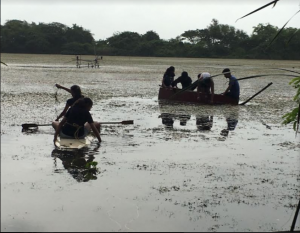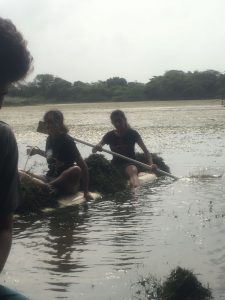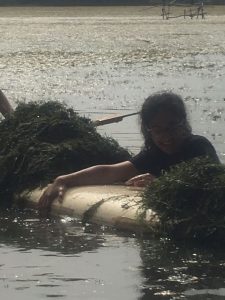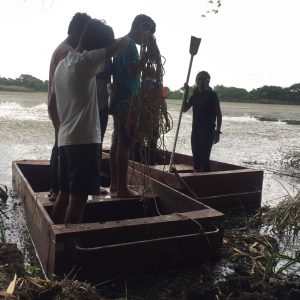Gavier lake is Surat city’s one of the very few nature reserves. It consists of a wide range of unique birds including both settled and migratory birds. Every year the lake gets covered with unwanted aquatic vegetation during monsoon season. This disrupts the ecosystem as it interferes in the food chain of many birds. We decided to volunteer in removing this weed to help conserve the ecosystem.
Learning Outcomes Achieved:-
- Learning outcome 2 – Demonstrate that challenges have been undertaken, developing new skills in the process. As the cleaning sessions took place early morning on the weekends mostly everyone lacked the enthusiasm required to complete the task. Instead of forcing everyone to work we made a game out of it. We divided ourselves into two teams and competed against each other to see who collected more weed. Also, few of the people were scared to touch the weed in the beginning. We helped them overcome this fear by showing them that it has no side effects by doing so ourselves. Another challenge we faced was that our boat kept getting filled with water. To prevent the boat from sinking in we assigned one person to drown the water out by collecting it in a bucket and throwing it out of the boat.
- Learning outcome 3 – Demonstrate how to initiate and plan a CAS experience. Working under the sun would make the cleaning sessions very tiresome and in the evening the place fills up with mosquitoes and other insects. So working at any other time than early morning seemed impractical. And because of this many of our friends raised objections as they would rather spend their weekend sleeping in. Convincing everyone was a big challenge as the task couldn’t be completed single-handedly. We convinced everyone by reminding them how cleaning the lake was necessary for the survival of birds and fishes. We also had to make sure that everyone was informed to wear fully covered clothes.
- Learning outcome 4 – Show commitment to and perseverance in CAS experiences. As mentioned earlier, cleaning of weed required us to sacrifice our beloved weekend mornings. But soon we looked past it as we saw how we were contributing to saving those beautiful birds.
- Learning outcome 5 – Demonstrate the skills and recognize the benefits of working collaboratively. This task required a lot of perseverance and patience. After struggling for a while we came up with a system. Two people from the boat collected the weed from the water, two others pilled it up in the boat and the person left removed water from the boat. Working together definitely helped us in building trust and it enhanced our team building skills.
- Learning outcome 6 – Demonstrate engagement with issues of global significance. Birds around the world are suffering due to this issue. Birds such as Cormorants and Kingfishers dive into the water to feed on the fish. If the lake stays covered from aquatic vegetation it makes it very difficult for them to find food and eventually this leads to their death. Migratory ducks who arrive in winter also need open water to land and take off on. If the weed is not cleaned it will result in a decline in their population. By catering to this issue locally we will also spread awareness about the same.
It was a very unique and memorable experience as it required getting our hands dirty. I don’t think I will ever forget it because one of my friends pushed me into the lake and I was all wet and covered in weed. To conclude, it was a fun and consummating experience.



